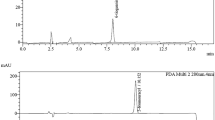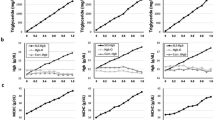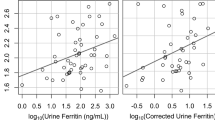Abstract
MANY enzymes contain sulphydryl groups essential to their activity; they are readily inactivated by oxidation. It is known that reduced glutathione protects them against oxidation1. In this respect hæmoglobin behaves in a similar manner to the ‘SH-enzyme’ in that its spontaneous oxidation to methæmoglobin is inhibited by glutathione2.
This is a preview of subscription content, access via your institution
Access options
Subscribe to this journal
Receive 51 print issues and online access
$199.00 per year
only $3.90 per issue
Buy this article
- Purchase on Springer Link
- Instant access to full article PDF
Prices may be subject to local taxes which are calculated during checkout
Similar content being viewed by others
References
Barron, E. S. G., “Adv. in Enzymol.”, 11, 201 (1951).
Holden, H. F., Biochem. J., 19, 727 (1925). Morrison, D. B., and Williams, jun., E. F., Science, 87, 15 (1938). Fegler, G., J. Physiol., 115, 123 (1951). Eggleton, P., and Fegler, G., Quart. J. Exp. Physiol. (in the press).
Keilin, D., and Hartree, E. F., Nature, 157, 210 (1946).
Woodward, G. E., and Fry, E. G., J. Biol. Chem., 97, 465 (1932).
Author information
Authors and Affiliations
Rights and permissions
About this article
Cite this article
FEGLER, G. Relationship between Reduced Glutathione Content and Spontaneous Hæmolysis in Shed Blood. Nature 170, 624–625 (1952). https://doi.org/10.1038/170624a0
Issue Date:
DOI: https://doi.org/10.1038/170624a0
This article is cited by
-
Favism-inducing toxins in broad beans (Vicia faba) biological activities of broad beans extracts in favism ? Sensitive subjects
Qualitas Plantarum Plant Foods for Human Nutrition (1977)
-
Die Glutathionperoxidase: Enzymologie und biologische Aspekte
Klinische Wochenschrift (1971)
-
Relationship Between Glutathione Stability and In Vivo Survival of Autologous, Deglycerolized, Resuspended Red Blood Cells
Nature (1965)
-
Der Stoffwechsel menschlicher Erythrozyten
Blut Zeitschrift für die Gesamte Blutforschung (1965)
-
Effect of black snake (Walterinnesia aegyptia) venom on the respiratory activity of some tissues of the rabbit
Zeitschrift für vergleichende Physiologie (1964)
Comments
By submitting a comment you agree to abide by our Terms and Community Guidelines. If you find something abusive or that does not comply with our terms or guidelines please flag it as inappropriate.



